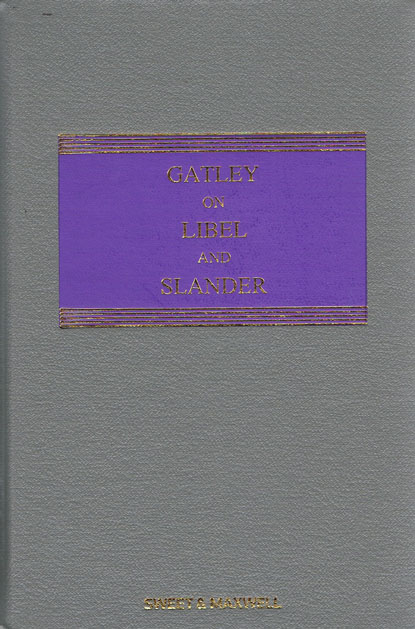Gatley on Libel and Slander 11th ed
ISBN13: 9781847034922
Published: December 2008
Publisher: Sweet & Maxwell Ltd
Country of Publication: UK
Format: Hardback
Price: Out of print
Gatley is the leading text on libel and slander. This new edition will keep practitioners up to date with the latest developments in the law of defamation, both substantive and procedural. It analyses the relevant case law, and guides the reader through practice and procedure in detail.
The new 11th edition incorporates the latest case law, explains new procedures and tracks the developing law in areas such as press freedom to report on matters of public interest.
- Provides an all-encompassing guide to the law of defamation
- Analyses the substantive law and discusses a wealth of significant recent case law
- Includes cases from other jurisdictions with commentary on their relevance to UK law and procedure, in particular decisions from Canada, Australia and New Zealand
- Discusses the jurisprudence of the European Court of Human Rights and the continuing effect of the Human Rights Act on defamation law
- Deals with defences and related causes of action such as criminal libel
- Includes forms and precedents for issuing proceedings, statements of case and settlements
- Reproduces key legislation
- Includes summaries of important libel awards in the appendix material
- Updates the reader with regular supplements
What’s new for the 11th edition
- Jameel v Wall Street Journal Europe: This decision of the House of Lords is certainly the most important case since Reynolds v Times Newspapers on qualified privilege and all earlier cases on Reynolds must be read subject to it. While there are some differences of opinion on the precise jurisprudential basis of Reynolds and its relationship to the traditional privilege for “private” communications, the general message is clear: Reynolds was a liberalising decision in favour of the freedom to report matters of public concern so long as the publisher adhered to the standards of responsible journalism and the various factors referred to by Lord Nicholls are not to be treated as a series of hurdles in a steeplechase.
- Seaga v Harper: Despite the references to “responsible journalism” in Reynolds, the Privy Council has held that it is not confined to news media publications. For example it applies to a statement by the defendant at a meeting or to a book.
- Charman v Orion Publishing: This Court of Appeal decision is the most important of a number of cases examining how far the law protects “reportage” or “neutral reporting”, an important issue in view of the traditional stance taken by the law that if A repeats defamatory imputations made by B about C, then A could not shelter behind the fact that the statement was originally made by B – the repetition rule. Another important decision on the repetition rule (and on reporting privilege) is Curistan v Times Newspapers.
- Jameel v Dow Jones: an important Court of Appeal decision on limited publication and abuse of process. Adelson v Associated Newspapers is another significant case on abuse of the process and proportionality in defamation proceedings, which also touches on statements in open court.
- Bunt v Tilley: the meaning of publication at common law and under the Defamation Act 1996 and the Electronic Commerce (EC) Directive Regulations 2002. Al Amoudi v Brisard, looks at the issue of the publication of defamatory material via the Internet.
- Culnane v Morris looks at the issue of political campaigning and defamation.
- Lowe v Associated Newspapers, Burstein v Associated Newspapers: two important decisions on fair comment.
- Buckley v Dalziel, Westcott v Westcott concern absolute privilege in the context of complaints to the police.
- The offer of amends procedure and defence under the Defamation Act 1996 has been clarified in a number of cases such as the Court of Appeal decisions in Milne v Express Newspapers, Nail v News Group and Turner v News Group. Warren v Random House is a significant first instance decision.
- Misuse of personal information is a wrong which has grown out of breach of confidence and increasingly important for those affected by publication in the media. Among the many new decisions considered in the text are Campbell v MGN, Von Hannover v Germany, Douglas v Hello! (No.3), McKennitt v Ash, Murray v Big Pictures (UK), HRH The Prince of Wales v Associated and Lord Browne v Associated Newspapers. Johnson v Medical Defence Union has revealed some uncertainty about the scope of the Data Protection Act 1998.
Gatley on Libel and Slander, though based on English law, continues to trace developments in other common law jurisdictions. Among many developments noted are the uniform Acts passed by the Australian states in 2005 and 2006. The Irish Defamation Bill is noted and may be passed before publication.
